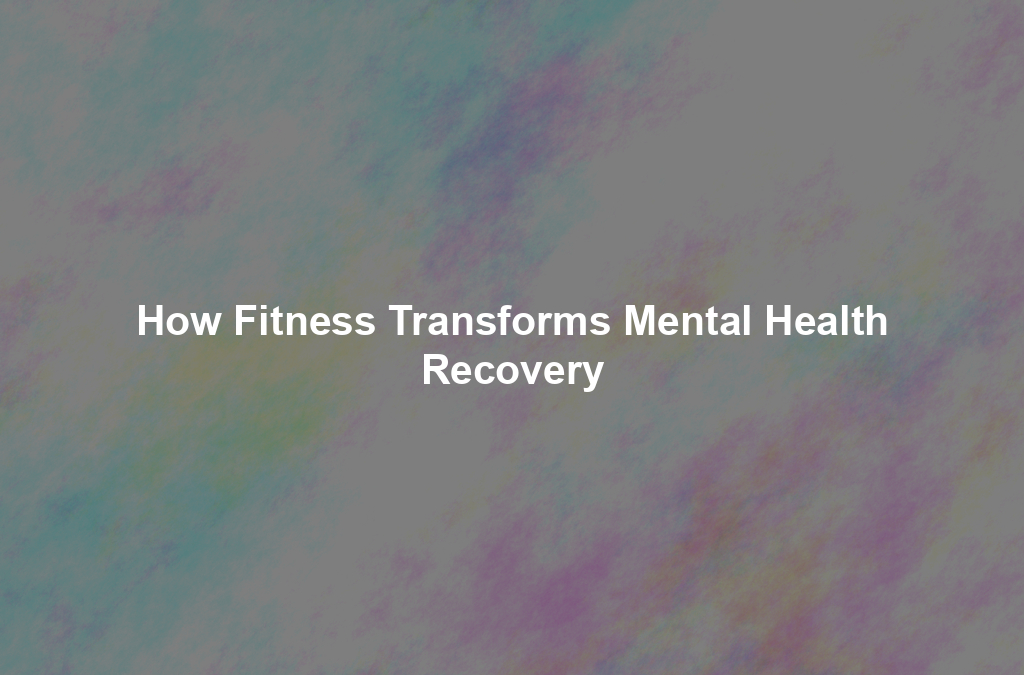
How Fitness Transforms Mental Health Recovery

Fitness plays a vital role in mental health recovery. Exercise transforms your mind and body, creating a path to ‘Wellness Reimagined: The Role of Fitness in Mental Health Recovery’. The role of fitness in mental health recovery involves more than just physical benefits. You experience emotional growth and resilience. Understanding this connection empowers you to embrace healing. Fitness becomes a powerful tool for overcoming challenges. You find strength and hope through movement. Recovery becomes a journey of renewal and transformation.
Wellness Reimagined: The Role of Fitness in Mental Health Recovery
Biological Mechanisms
Neurotransmitter Regulation
Exercise transforms your brain chemistry. Physical activity releases endorphins. These chemicals create feelings of happiness. Regular movement boosts serotonin levels. Serotonin improves mood and reduces anxiety. Fitness reimagines wellness by enhancing neurotransmitter balance.
Hormonal Balance
Exercise regulates hormones. Physical activity lowers cortisol. Cortisol is a stress hormone. Lower levels lead to reduced stress. Fitness increases dopamine production. Dopamine enhances motivation and pleasure. Wellness reimagined involves a harmonious hormonal balance.
Psychological Benefits
Stress Reduction
Exercise acts as a natural stress reliever. Physical activity reduces tension. Movement helps clear the mind. Engaging in fitness activities promotes relaxation. Stress fades away with consistent exercise. Wellness reimagined means living with less stress.
Mood Enhancement
Fitness lifts your spirits. Exercise increases energy levels. Physical activity leads to a positive outlook. Regular workouts boost self-esteem. Confidence grows through physical achievements. Wellness reimagined brings joy and optimism into life.
Benefits of Fitness in Mental Health Recovery

Improved Cognitive Function
Memory Enhancement
Exercise enhances memory. Physical activity stimulates brain function. The brain creates new neural connections. These connections improve memory retention. Regular workouts boost cognitive abilities. Fitness transforms mental clarity. Wellness Reimagined: The Role of Fitness in Mental Health Recovery highlights this transformation. You experience sharper recall and better information processing.
Increased Focus
Fitness increases focus. Exercise sharpens concentration. Physical activity trains the mind to stay present. You develop the ability to concentrate on tasks. Consistent exercise improves attention span. Wellness Reimagined: The Role of Fitness in Mental Health Recovery emphasizes this benefit. You find yourself more engaged and productive.
Emotional Resilience
Coping with Anxiety
Exercise helps manage anxiety. Physical activity reduces anxious feelings. Movement provides a healthy outlet for stress. You learn to cope with anxiety through fitness. Wellness Reimagined: The Role of Fitness in Mental Health Recovery showcases this coping mechanism. You gain control over emotions and find peace.
Managing Depression
Fitness combats depression. Exercise lifts the mood. Physical activity releases endorphins. These chemicals create feelings of happiness. Regular workouts reduce depressive symptoms. Wellness Reimagined: The Role of Fitness in Mental Health Recovery demonstrates this positive impact. You discover joy and hope through movement.
Types of Exercises for Mental Health

Aerobic Exercises
Running
Running offers a powerful way to boost mental health. The rhythmic motion of running releases endorphins. These natural chemicals elevate mood and create a sense of well-being. Running enhances cardiovascular health, which supports overall wellness. The repetitive nature of running provides a meditative experience. This helps clear the mind and reduce stress. Running serves as a key component in Wellness Reimagined: The Role of Fitness in Mental Health Recovery. The simple act of putting one foot in front of the other transforms mental clarity.
Cycling
Cycling provides an excellent aerobic workout. The activity strengthens both the body and mind. Cycling increases stamina and improves cardiovascular function. The outdoor environment during cycling offers exposure to nature. This connection with nature boosts mood and reduces anxiety. Cycling encourages social interaction when done in groups. The sense of community enhances emotional well-being. Cycling plays a vital role in Wellness Reimagined: The Role of Fitness in Mental Health Recovery. The freedom of movement on a bike creates a sense of liberation.
Mind-Body Practices
Yoga
Yoga combines physical postures with mindful breathing. This practice fosters a deep connection between body and mind. Yoga reduces stress and promotes relaxation. The gentle movements increase flexibility and strength. Yoga enhances mental focus and concentration. Practicing yoga regularly cultivates inner peace and balance. Yoga stands as a cornerstone in Wellness Reimagined: The Role of Fitness in Mental Health Recovery. The harmony achieved through yoga nurtures emotional resilience.
Tai Chi
Tai Chi offers a graceful form of exercise. The slow, deliberate movements improve balance and coordination. Tai Chi encourages mindfulness and present-moment awareness. This practice reduces anxiety and enhances mental clarity. Tai Chi promotes relaxation and stress relief. The meditative nature of Tai Chi fosters a sense of calm. Tai Chi contributes significantly to Wellness Reimagined: The Role of Fitness in Mental Health Recovery. The fluid motions of Tai Chi create a soothing rhythm for the mind.
Practical Tips for Incorporating Fitness
Setting Realistic Goals
Short-term Milestones
Start with achievable goals. Focus on small steps. Celebrate each success. Short-term milestones build confidence. These milestones keep motivation high. Track progress regularly. Adjust goals as needed. Success in small steps leads to bigger achievements.
Long-term Vision
Create a vision for the future. Picture where you want to be. Set clear, long-term goals. Keep these goals inspiring and reachable. Break them into manageable parts. Stay committed to your vision. Long-term goals guide your journey.
Creating a Routine
Consistency
Develop a consistent routine. Choose specific days and times for exercise. Make fitness a regular part of life. Consistency builds habits. Habits lead to lasting change. Stick to the schedule even when motivation dips. Consistent effort brings results.
Flexibility
Stay flexible in your approach. Life can be unpredictable. Adapt your routine when needed. Explore different activities. Find what brings joy and satisfaction. Flexibility keeps fitness enjoyable. An adaptable routine supports ongoing success.
Overcoming Barriers to Exercise
Motivational Challenges
Finding Inspiration
Finding inspiration can transform your fitness journey. Inspirational stories from others can ignite your passion. Music with an uplifting beat can energize your workouts. Visualizing your goals can keep you focused. A motivational quote can provide a daily boost. Surround yourself with positive influences.
Staying Committed
Commitment requires dedication. Setting reminders helps maintain consistency. A workout buddy can offer support and accountability. Celebrating small victories keeps motivation high. Tracking progress shows how far you’ve come. Commitment becomes easier with a clear purpose.
Physical Limitations
Adapting Exercises
Adapting exercises ensures inclusivity. Modifying movements allows for comfort and safety. Resistance bands can replace heavy weights. Chair exercises offer a seated alternative. Water aerobics provide low-impact options. Adaptations make fitness accessible for everyone.
Seeking Professional Guidance
Professional guidance enhances your fitness experience. A personal trainer offers tailored advice. Physical therapists provide specialized support. Nutritionists guide dietary choices. Doctors ensure safe exercise plans. Expert help leads to effective and enjoyable workouts.
Fitness transforms mental health recovery. Exercise empowers you to overcome challenges and embrace healing. Physical activity enhances mood, reduces stress, and boosts cognitive function. Fitness becomes a powerful tool for emotional resilience. Integrating fitness into daily life leads to ongoing benefits. Consistent movement fosters a sense of well-being and vitality. You find strength and hope through exercise. The journey of recovery becomes one of renewal and transformation. Embrace the power of fitness for a healthier mind and body.


